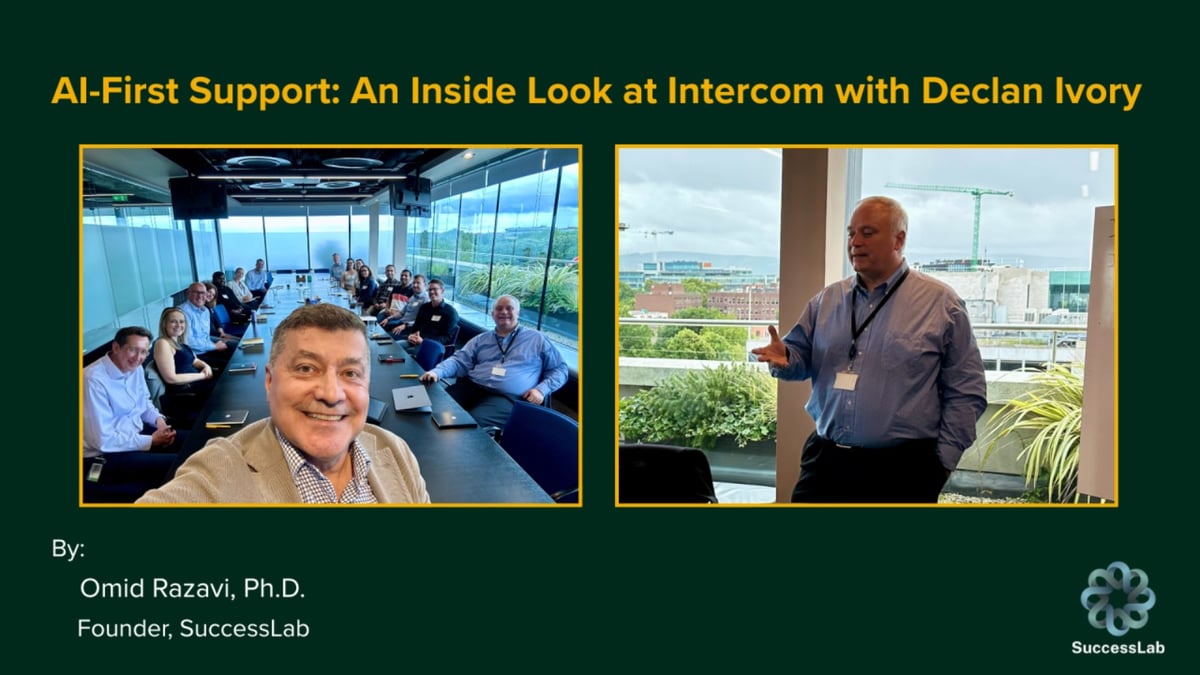AI-First Support: An Inside Look at Intercom with Declan Ivory

Omid Razavi
July 6, 2025
Last month, I had the privilege of joining top CX leaders at the CX Executive Roundtable in Dublin, hosted by Declan Ivory, VP of Customer Support at Intercom, and organized by SuccessLab. The event was a masterclass in how AI is already transforming customer support, not in theory, but through real-world execution. Among the standout stories was Intercom’s, where AI isn’t just a tool, but a foundational shift in how support is delivered, scaled, and measured.
I caught up with Declan afterward to unpack Intercom’s AI-first journey and surface practical lessons for support leaders building intelligent, high-impact functions. Here's our conversation:
Omid Razavi: Declan, thank you for having me at Intercom in Dublin. Let’s dive right in. You've led support across multiple organizations. Has there been a consistent North Star for support throughout your career?
Declan Ivory: Absolutely. In every organization I’ve been part of, the North Star has always centered around customer experience, measured through CSAT, service levels, or relationship management. The methods may differ, but the obsession with delivering to customer expectations has remained consistent. It’s about pushing the boundaries on service and testing ourselves against real customer outcomes.
The North Star has always centered around customer experience. The methods may differ, but the obsession with delivering to customer expectations has remained consistent. - Declan Ivory
Omid: That’s refreshing. Too often, support is seen as a cost center or just a reactive function. But the way you position support—front and center in driving brand value—is powerful.
Declan: I’ve been fortunate to work at companies where support was seen as a critical part of the brand. We recognize that for many customers, especially those in consumer or SaaS models, support is a key part of the product experience. If you fail at that moment, you undermine everything else.
Support is a key part of the product experience. If you fail at that moment, you undermine everything else. - Declan Ivory
Omid: And now we’re entering a new phase with AI. You articulated this evolution well—support is no longer just about resolution; it’s about sensing, learning, and adapting. How did that shift happen at Intercom?
Support is no longer just about resolution; it’s about sensing, learning, and adapting. - Omid Razavi
Declan: It started with rethinking how we measure customer experience. Traditional CSAT was too reactive and had a narrow scope. Prior to Intercom, at Google Cloud, we created a health score based on 12 dimensions, including sentiment using NLP. That exposed issues CSAT missed. One customer had 100% CSAT from one enthusiastic user, but sentiment analysis revealed a slow decline across other stakeholders. That’s when we knew we needed broader, case-by-case intelligence.
Omid: That's where your Customer Experience Score (CXS) at Intercom comes in?
Declan: Exactly. We implemented a method utilizing AI to assess the customer experience for every customer support conversation and generate a new metric called the Customer Experience (CX) Score. The capability is now also available to customers as part of our Fin AI Insights product. Having this score at the conversation level is excellent. Still, next, we are aggregating it at the ‘customer’ level so we can use anomaly detection to detect a decline in ‘customer experience’ and proactively address the situation. We will also link it to product components, so we can inform product and engineering teams exactly how their areas are impacting customer experience.
Omid: Like a league table for product teams?
Declan: That’s the vision. No one wants to be at the bottom. It drives accountability and focus.
Omid: That kind of innovation doesn’t happen without structural change. What organizational measures did you take to support AI adoption?
Declan: We built a dedicated AI Support team early on. Two critical roles emerged: Conversation Designer and Knowledge Manager. The designer role ensures seamless customer journeys with the AI agent Fin. It’s about removing friction and making the handoffs between automation and human support smooth. The Knowledge Manager role has evolved from an administrative to a strategic one, ensuring our content is high-quality, consistent, and deeply integrated into our product lifecycle.
Omid: That’s a vast cultural shift, too. How did the team react?
Declan: At first, there were concerns, understandably, about AI replacing jobs. But we took a transparent approach. We emphasized that AI wouldn't replace people but empower them. We involved the team early, utilizing tools like summarization features and allowing them to influence our strategy. Now, they’re recommending content improvements, helping refine Fin, and even moving into the new roles that we have created.
Omid: And you’re now seeing real results?
Declan: Yes. We're at a 92% AI involvement rate and a 78% resolution rate. That’s because we’ve been deliberate. We segment queries into four types: informational, personalized, transactional, and troubleshooting. We initially focused on addressing informational questions from customers to learn and understand how to optimize an AI agent. However, the other three areas also offer significant potential for AI to further enhance the customer experience. You need to consider which of your business systems require integration, as well as the data sources that may need to be accessed via API or MCP (Model Context Protocol). That’s where our AI Insights tool helps us guide customers to know where to target their efforts.
Omid: You’ve operationalized AI success. What advice would you give to others trying to reach these benchmarks?
Declan: Start with content. Structure matters; FAQs with “yes/no” answers won’t cut it. Then, focus on integration. Does your agent have access to the necessary context? Finally, expand the involvement rate fast. Don’t keep your AI agent in a sandbox forever. It’s a two-way door — you can turn it off if needed.
Omid: And your support team is helping customers achieve the same?
Declan: Exactly. Through our Fin AI Insights product and professional services, when necessary, we help customers identify the right content gaps, segmentation, and integrations. For customers who engage deeply, we now offer a 65% resolution guarantee within 90 days.
Omid: Do you foresee a change in monetization models? What’s the future of Customer Support?
Declan: Monetization has changed. Fin is changed based on the outcome - you only pay if Fin resolves the customer issue. Customer Support is evolving. It’s no longer just about faster SLAs. It’s about value, proactive insights, tailored support for complex issues, and strategic advice. AI enables more—but doesn’t replace the need for trusted human relationships, especially in high-stakes environments.
Omid: Where do you land on the future role of generalists versus specialists?
Declan: It depends on the industry. In ours—deeply technical—we need specialists. In other sectors, generalists empowered by AI may suffice. However, I don’t believe humans will be left out of the loop anytime soon. AI will change the nature of the role, not eliminate it.
Omid: That aligns with the “85-15-5”, where 85% of support is AI-powered, 5% is humans managing AI, and 10% is humans handling exceptions and training the system.
Declan: That’s a fair framing. But we’re still early. Our goal is that every new issue we resolve should be the last time a human needs to resolve it. That mindset shift—first-time resolution becomes last-time manual intervention—is what drives continuous improvement.
Omid: Beautifully said. You’ve built something rare—an AI-first support model that’s deeply human in approach. Thank you, Declan. Your peers will find this incredibly valuable.
Declan: Thanks, Omid. Always a pleasure.
This conversation with Declan—and the CX Executive Roundtable more broadly—highlighted a core principle: AI is at its best when it augments people. The most successful support orgs are no longer dabbling in pilots—they’re applying AI at scale, anchoring it in customer relationships, and driving measurable value.
Support is evolving: from reactive to proactive, from transactional to consultative. The companies thriving in this new era are those that blend innovation with human intention.
Huge thanks to Declan and the Intercom team for their warm hospitality—and to every leader who contributed their insights.
What resonates most with you from this conversation? How is your organization approaching the AI transformation in customer support?
Let’s continue the discussion in the CSS Communities. We have a great deal to learn from one another.
Like
Comments (0)
Popular
Dive in
Related
Blog
Scaling Success: How Salesforce is Transforming Customer Support with Empathy and AI
Sep 24th, 2024 • Views 0
Blog
John Sabino at the CSS Executive Forum London: A Blueprint for Responsible, Customer-First AI
Nov 24th, 2025 • Views 5
Blog
John Sabino at the CSS Executive Forum London: A Blueprint for Responsible, Customer-First AI
Nov 24th, 2025 • Views 5
Blog
Scaling Success: How Salesforce is Transforming Customer Support with Empathy and AI
Sep 24th, 2024 • Views 0

